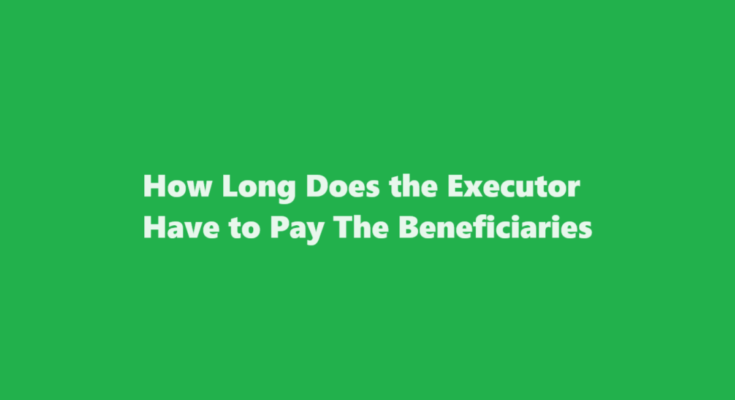Introduction
When someone passes away and leaves behind a will, the executor is responsible for managing the deceased’s estate and distributing assets to the beneficiaries as outlined in the will. The timeline for paying beneficiaries can vary depending on several factors, including the complexity of the estate, legal requirements, and the terms specified in the will. In this article, we will explore the factors influencing the duration it takes for an executor to pay beneficiaries and the legal obligations involved.
Legal Framework
The process of distributing assets to beneficiaries is governed by a legal framework, which varies from one jurisdiction to another. In the United States, for example, the Uniform Probate Code (UPC) provides a guideline for this process. Executors are generally required to act prudently and in a timely manner when carrying out their duties.
In most cases, an executor should file the will in probate court and notify beneficiaries and potential creditors within a certain timeframe. After this, the executor must identify and inventory the assets, settle debts, and, eventually, distribute the remaining assets to the beneficiaries as per the terms of the will. The legal requirements can significantly impact the timeline for payment.
Complexity of the Estate
The complexity of the deceased’s estate plays a significant role in determining how long it takes for the executor to pay beneficiaries. Simple estates with few assets, clear beneficiaries, and no disputes are generally processed more quickly. However, complex estates with numerous assets, multiple beneficiaries, disputes, or unresolved debts can take much longer to settle.
Estate assets may include real estate, investments, personal property, and various financial accounts. The more assets there are to manage, the longer it may take to complete the inventory, especially if the assets are difficult to appraise or require specialized expertise.
Outstanding Debts
Before beneficiaries can be paid, an executor must ensure that all the deceased’s outstanding debts and obligations are satisfied. This includes mortgages, loans, taxes, and any other financial obligations. Resolving these debts can prolong the distribution process. Additionally, creditors may need to be given an opportunity to file claims against the estate, further delaying the final distribution.
If the deceased had substantial debts, the executor may need to sell assets to cover these obligations, which can be a time-consuming process. Beneficiaries must wait until all debts have been resolved before receiving their share of the estate.
Will Contest or Disputes
Disputes among beneficiaries or contests regarding the validity of the will can significantly prolong the time it takes for an executor to pay beneficiaries. In such cases, the executor may need to work with legal counsel to address these disputes, which can be a lengthy and costly process.
Beneficiaries who believe they were unfairly treated in the will, or who suspect foul play, may contest the will’s validity or challenge the executor’s decisions. These legal battles can delay the distribution of assets for an extended period, as the court must make a determination regarding the disputes.
Distribution Terms in the Will
The terms specified in the will can also impact the timeline for paying beneficiaries. Some wills provide specific instructions for when and how assets should be distributed, while others may grant the executor more discretion. If the will dictates a specific timeline for distribution, the executor must adhere to these instructions.
In cases where the will is less prescriptive, the executor may have more flexibility but must still act in a timely and responsible manner. Beneficiaries may be concerned if they perceive the executor is unnecessarily delaying the process, and this can lead to conflicts or legal action.
FREQUENTLY ASKED QUESTIONS
How long does it take to pay beneficiaries?
Several factors determine how long an executor must wait to pay beneficiaries. Like the size and complexity of the estate, the amount of debt and taxes owed, and any legal or administrative challenges. It takes several months to several years for beneficiaries to receive their payments.
What is the time period to settle a death claim?
As per the time limits set by the Insurance Regulatory and Development Authority (IRDA) of India, insurers should settle death claims within 30 days. This condition applies to all claims where the insurer does not see the need to investigate the cause of death.
Conclusion
The duration it takes for an executor to pay beneficiaries is influenced by several factors, including legal requirements, the complexity of the estate, outstanding debts, disputes, and the distribution terms in the will. While some estates can be settled relatively quickly, others may take several months or even years to finalize.
Executors are expected to act diligently and in the best interests of the beneficiaries, ensuring that all legal obligations are met. Beneficiaries, in turn, should remain patient and work cooperatively with the executor to facilitate the distribution process. In cases of disputes or concerns about the executor’s actions, seeking legal counsel may be necessary to ensure a fair and timely distribution of assets. Ultimately, the timeline for paying beneficiaries is a delicate balance between fulfilling legal obligations and addressing the specific circumstances of the estate.
Read Also : Mastering The Art of Drawing Eagles – A Step-by-Step Guide



